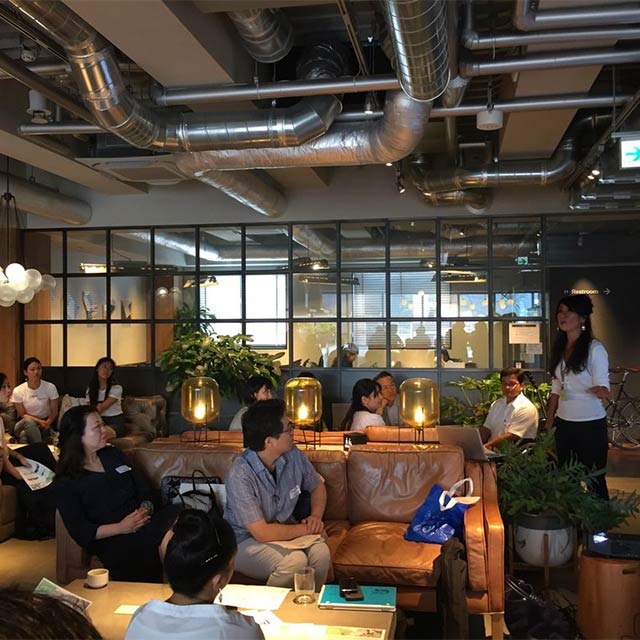From Mountains to Mountains: Nana Korobi, Ya Oki 七転び八起き
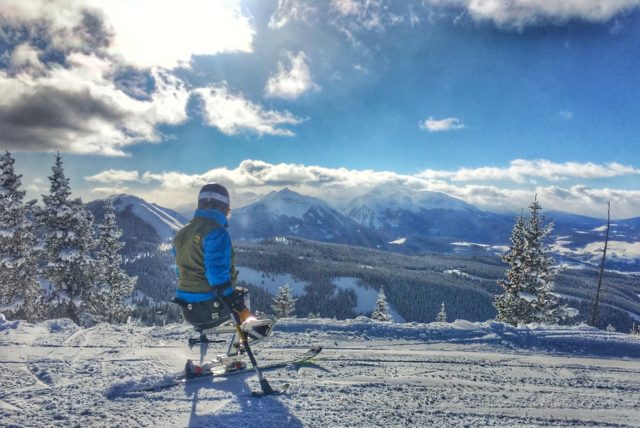
TASP is highly recognized for its successful adaptive ski program
My “office” is the snow-covered, 4,000 meter mountain peak in southwest Colorado. My morning commute to work is via gondola cable car that carries me above the snowy mountainside, with my travel mug of green tea steaming up the windows. I am a ski instructor with Telluride Adaptive Sports Program (TASP) in Telluride, Colorado, USA, a non-profit organization that teaches skiing and other sports to people with disabilities. I often pinch myself in disbelief.
How did a girl from sea-level New Jersey, severely afraid of heights, end up as a ski instructor in Colorado, with over a decade spent living in Japan along the way? What adventures lie ahead in February 2020 as I join a TASP group of 20 incredibly independent disabled skiers who may ski on one leg, with no vision or in a chair ski due to variety of physical disabilities?
Instructors and students alike will encounter new challenges as we figure out how to navigate Japanese public transportation with wheelchairs, how to get in and out of Japanese ramen restaurants, hotels, onsen and ski lifts. The focus of the trip is to ski the world-famous “Ja-Pow,” but within this trip and all TASP programs is the personal and group accomplishments derived from experiencing and overcoming what once seemed impossible.
Sea-level Start
I was born in 1961 into a family of school teachers in suburban New Jersey, USA. There was a large National Geographic map of the world covering the entire wall of our family living room, always reminding me and my 3 siblings that there was an enormous world out there. As overseas travel was prohibitively expensive for us, we travelled by car in the US, and traveled by books and TV into the far reaches of the globe. Our family also provided home stays to both international students and teachers, welcoming these guests to deliver a taste of their countries directly to our American home. Through them, I learned about many countries and customs.
In 1981, I was adrift. After 2 years of college at Stanford University in California, I was still uncertain of my major or my future. I decided to take a “gap-year.” Through the Stanford program Volunteers in Asia, I travelled with nothing more than a duffle bag for a year in a rural alternative community in the “yuki guni” of Yamagata-Ken, Japan. The winter there was harsh, with 4 meters of snow burying the window of my ground floor dorm room. We strapped on skis to walk around the village, but were far from downhill slopes of ski resorts. We spent our days digging out snow tunnels, making pickled daikon and staying warm under the kotatsu with our kerosene heaters. I loved the lonely, bare scenery of the winter in Yamagata, a few orange persimmons hanging on an otherwise bare tree dotting the white, snowy mountainside.
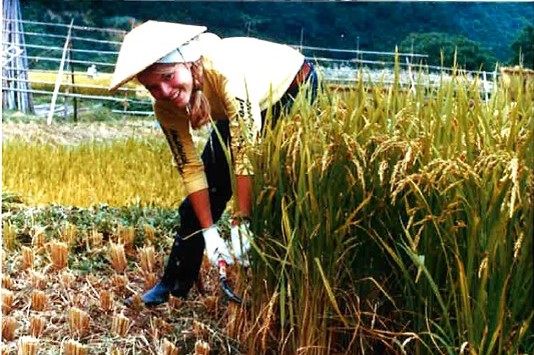
The author in Yamagata, Japan in 1981
My “gap year” proved fruitful. I returned to Stanford with a renewed focus on both Japanese language and Japan–US trade relations. Upon graduation in 1984, I was admitted to Stanford’s Master’s degree program in East Asian Studies, having been awarded a US Department of Education Foreign and Area Studies (FLAS) scholarship to fund my studies. The first year of my 2-year master’s study was spent at the Inter-University Center in Tokyo (now located in Yokohama), studying intensive Japanese language. I lived in a danchi in Tsukiji, just blocks from the world’s largest fish market, with the freshest fish and noisiest surroundings a poor grad student could ask for. During this time, I met my husband in a Stanford Japanese class. We would share a deep curiosity and love of Japan, and decades of connection to this very special country. In the summer of 1985, I participated in the 36th Japan American Student Conference (JASC) where I met many special Japanese friends.
Before the ink on my master’s degree diploma was dry, to my surprise, I was recruited to work in the newly liberalized Japanese financial markets. With no real interest in finance, but Japanese language skills and an aptitude for logic, I was trained as a researcher and yen-equity analyst for British, Hong Kong-based Jardine Fleming. It was a heady time for a young American woman in Tokyo. While people often asked if it was difficult as a conspicuous, young, foreign female in a male-dominated industry in Tokyo, I actually used it to my advantage, as the public-relations bu-cho at any publicly traded Japanese company generally would grant the young American woman a question at annual investors meetings or allow a visit to their companies. After the birth of my daughters (now ages 24 and 27) in Aoyama’s Sanno Byoin, I moved into the nonprofit world of the US Fulbright Commission, organizing home stay experiences for outgoing Japanese Fulbright scholars destined for research in the US.
Eventually I repatriated to the United States with my husband and children. We lived in Atlanta, Georgia for over a decade, where the only opportunities for using my Japanese language skills were at the cities’ few Japanese restaurants and with Japanese home stay students we hosted. We took a few trips back to Japan, renting apartments in our old neighborhood so we could relive the experience of living in Japan, rather than just visiting.
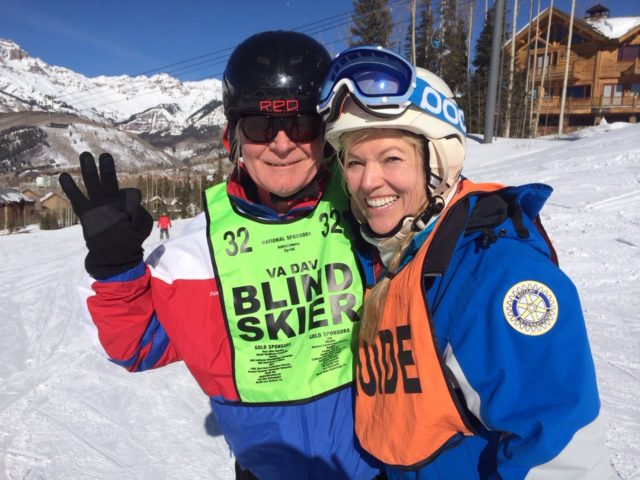
Author (right)
Middle-Aged Mama Meets Mountains
When my 28 year marriage was ending, I recalled the Japanese kotowaza and the image of the dharma: Nana korobi, ya oki. “Fall down seven times, stand up eight times.” I decided to spend my winter in our Telluride besso, a historic 1880’s miner’s shack that my ex-husband and I had remodeled with the dream of retiring in the mountains. Having no friends in Telluride, and feeling profoundly lonely and adrift, I knew the only way forward was to serve others. I found myself at the TASP office, offering my limited ski skills and tenaciously positive attitude to assist skiers with disabilities. I had to battle my own demons, fear of heights, feelings of inadequacy, and mourn the end of a long marriage. By devoting myself to improve my skiing, face my acrophobia and show up at TASP on dark, cold mornings, the springtime arrived with wildflowers, and my heart also bloomed.
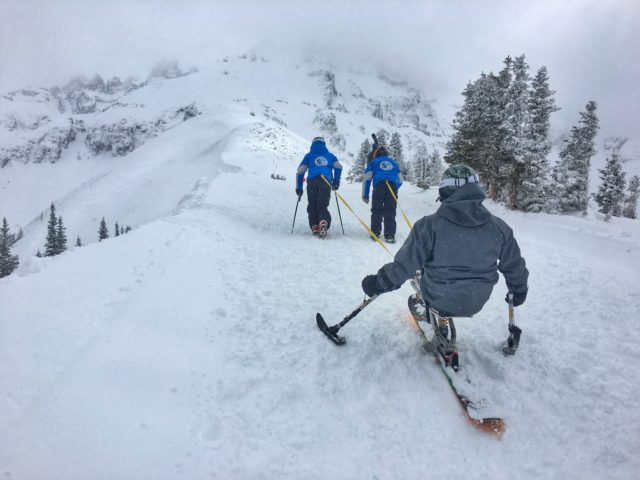
“Mono” skiing
Expand Your Horizons Across an Ocean
TASP has taken groups of 12 skiers with disabilities to ski in Chile for the past 4 southern-hemisphere winters. This particular camp is offered to our most advanced skiers, and has been tremendously successful in developing international travel opportunities, ski skills, life skills and joy in this group of disabled athletes.
In Feb 2020, TASP will embark on an entirely new ski trip, taking 20 disabled skiers to Japan. The focus will be to ski the world famous Japanese slopes but underneath the real adventure is the first step on the plane and the incredible people that make that step.
More About Telluride Adaptive Sports Program (TASP)
The Telluride Adaptive Sports Program (TASP) is a non-profit organization dedicated to enriching the lives of people with disabilities by providing educational and recreational opportunities that develop life skills, encourage personal growth, and promote independence. Participants range in age from 4 to 94 and may have physical, emotional and/or cognitive disabilities. TASP offers adaptive skiing, rafting, kayaking, rock climbing, cycling clinics, international trips and a whole host of other activities that allow students to participate on an equal level with their family and friends in a safe, fun, outdoor environment. These challenging activities catalyze our students’ ability to become more active, contributing members of their communities.
TASP is highly recognized for its successful adaptive ski program which has been in operation as an independent non-profit organization since 1996. The team of professional ski and snowboard instructors and trained volunteers provide lessons, ski buddies, and guiding services seven days a week from late November through early April at the Telluride Ski Resort. TASP also offers a variety of summer activities including adaptive cycling, mountain biking, kayaking, rafting, canoeing, hiking, rock climbing, fishing, overnight camping and 4WD tours. TASP is a leader in providing results-oriented adaptive recreational activities. At TASP, it is through taking on the challenges of stimulating outdoor activities where people with disabilities achieve amazing personal successes that not only help them find a sport but in all aspects of life.
During the winter, TASP accomplishes its mission of empowerment and challenge mainly through our adaptive ski school, providing tailored and individualized lessons daily throughout the season. In addition, specialty programs, such as a Special Olympics race team, back country hut trips, and military oriented camps take place all winter long. TASP proudly provides over $100,000 USD in scholarship opportunities to those in financial need and supports local communities by providing regional-specific programming and opportunities. As a further commitment to the community and its mission of inspiring, TASP conducts disability awareness training for local school aged youth in order to promote awareness and educate the next generation about the limitless potentials of adaptive recreation.
The ground breaking trip to Japan offered by TASP is a unique opportunity for people with disabilities. Our goal is to create a trip that will mix time on the ski slopes, onsen adventures and culturally-based experiences to explore more about Japanese culture and this beautiful country. The allure of Japan permeates the ski culture around the world as you read about “Japow” and the striking volcanic peaks that produce some of the best snow in the world. As an out-of-the-box thinking and front running adaptive program, TASP sees that there are no offerings for people with disabilities available nor had it been done before and want to close this gap.
The trip is designed with accessibility at the forefront. For someone with a disability, it is not an easy thing to travel to another country, with variability in what is considered accessible and what truly is accessible or not. To help mitigate some of these, the TASP Japan 2020 trip will include several atypical components such as a private shuttle instead of public transportation, we may stay at certain hotels that accommodate wheelchairs even though they cost a little more and will ski in the same area. Although it might look a little different, this one of a kind trip will offer a memorable experience to all those who embark on this adventure.
We hope to provide an opportunity for a trip of a lifetime in Japan for persons with a disability. To see that the disability doesn’t hold one back from traveling to Japan, changes the lens which one can view the world. If they can do that, what else can they do? What else might have been just behind a curtain now looks possible.
To learn more about Telluride Adaptive Sports Program, please visit our website. TASP is a 501(c)(3) non-profit organization. All donations are tax deductible. We welcome donations of funds or services to enable us to continue our program in Japan and around the world.
Born in New Jersey, having lived in Tokyo, I now live in Telluride, Colorado. I am an instructor at Telluride Adaptive Sports Program (TASP). I serve on the board of the Telluride Theatre, and volunteer at the Telluride Film Festival. I am active in Stanford University Alumni Association in admissions interviewing. I enjoy skiing, hiking, reading, and the challenges of high altitude gardening.

